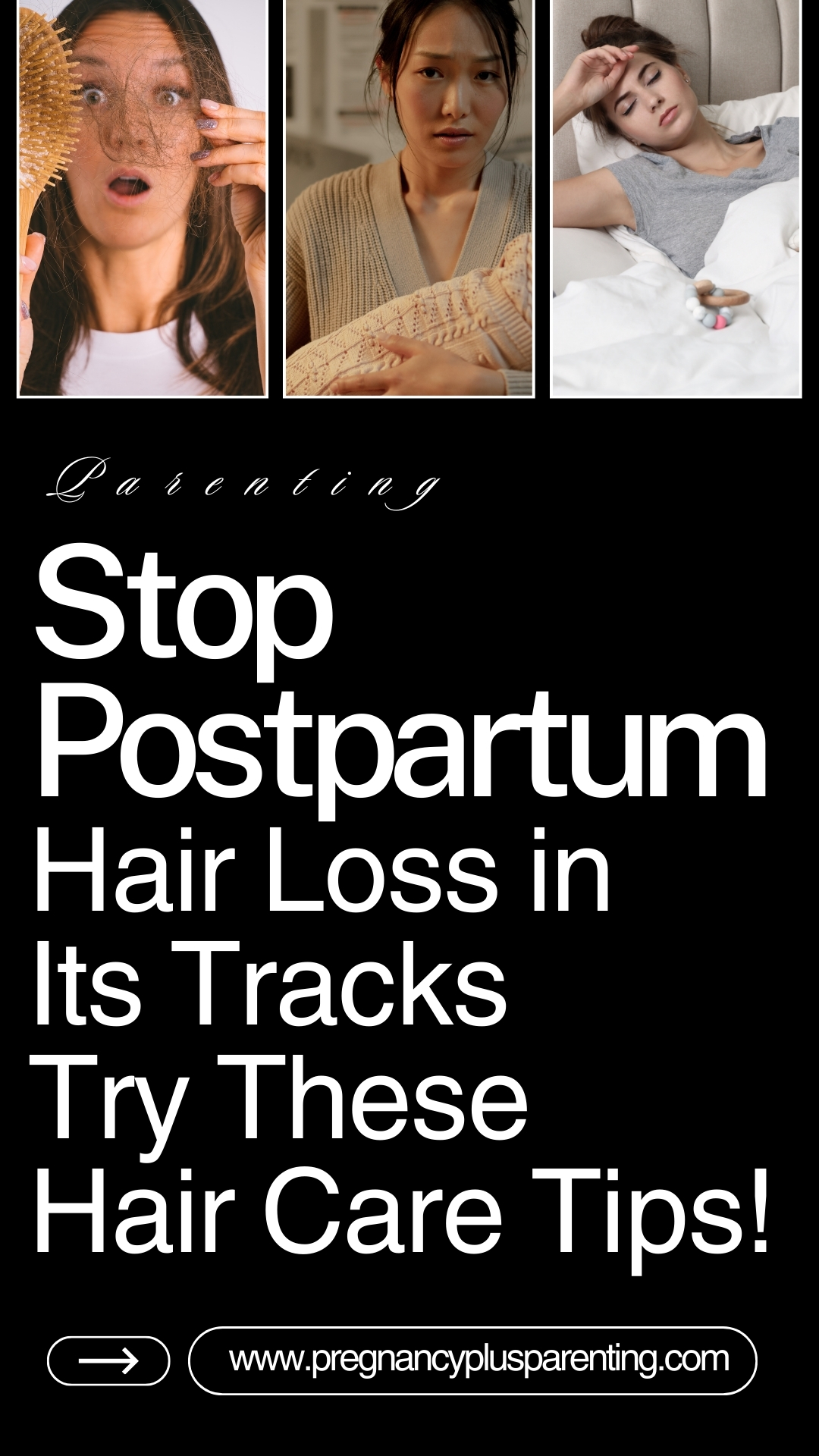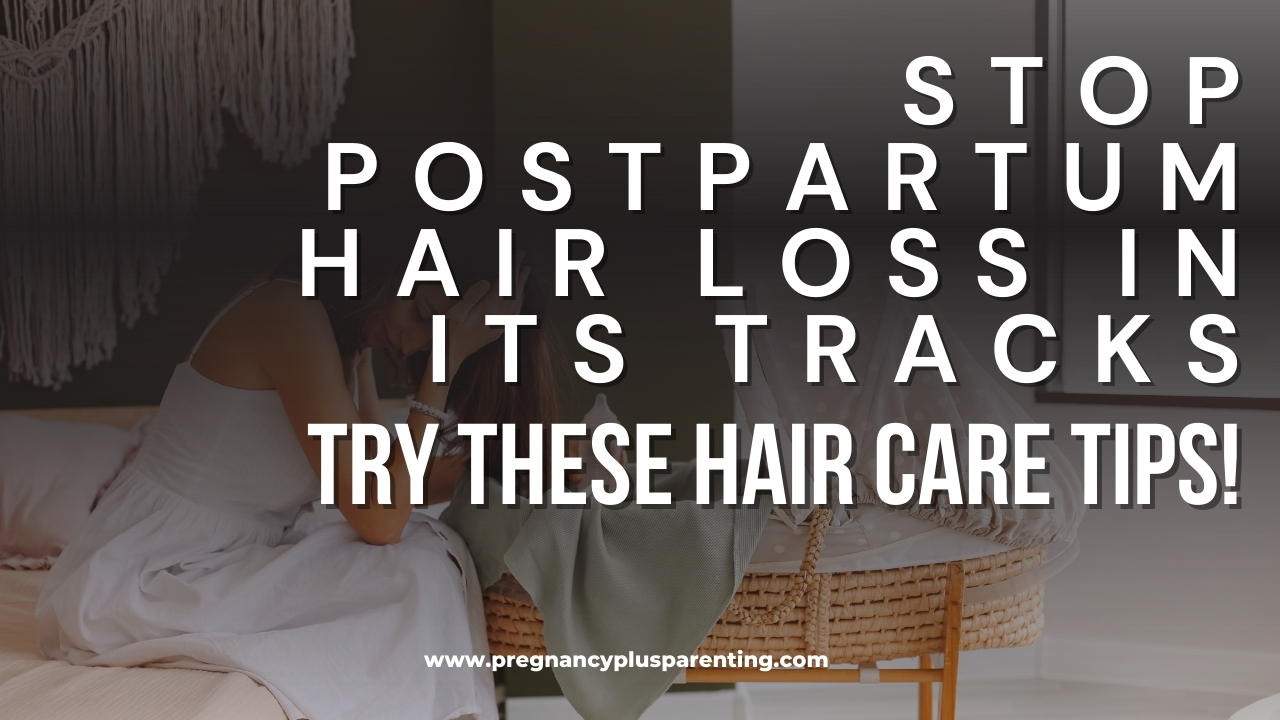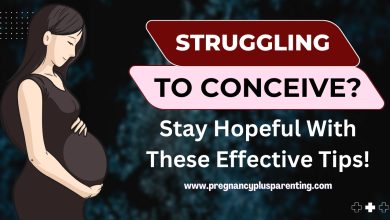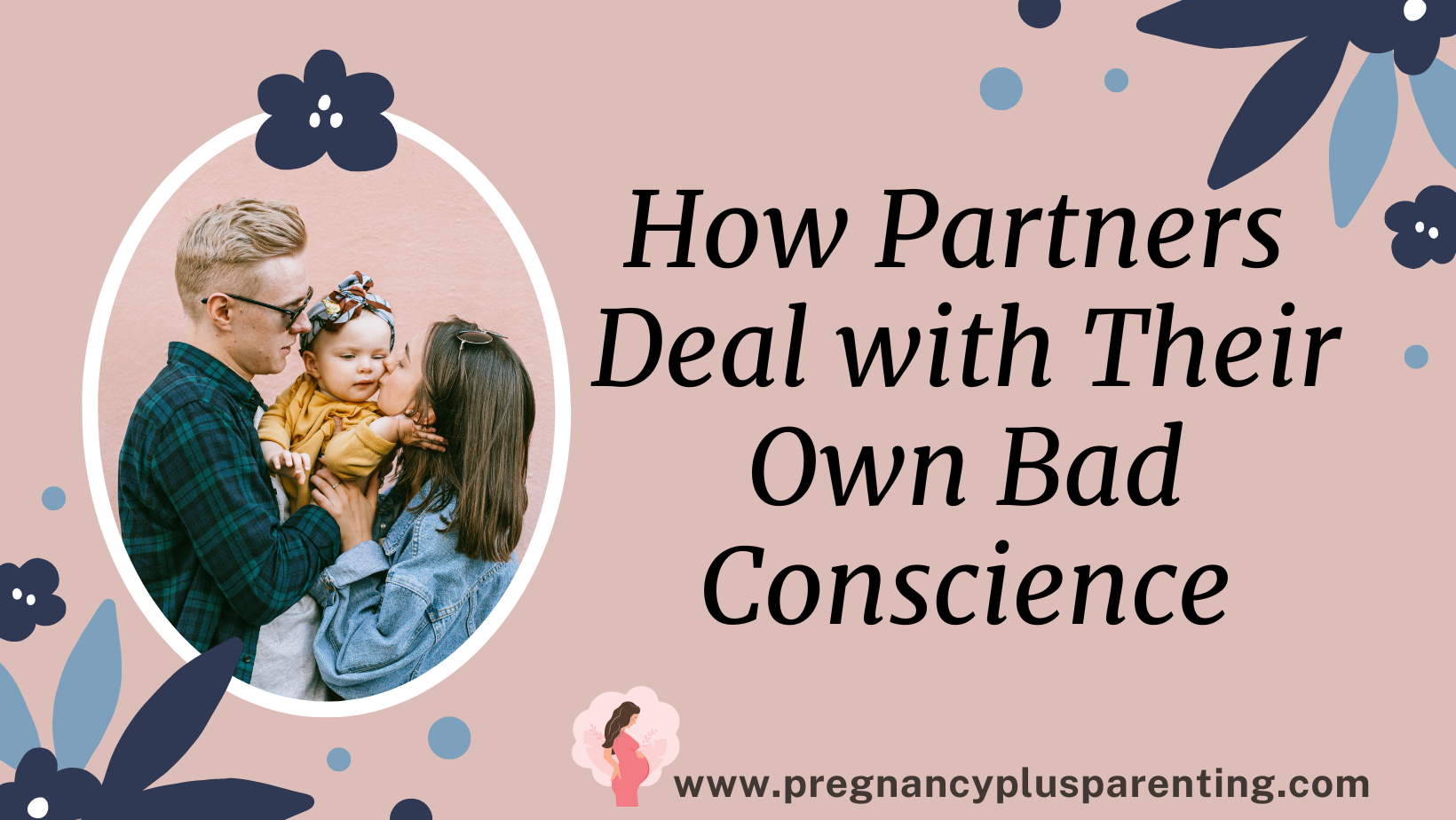Stop Postpartum Hair Loss in Its Tracks – Try These Hair Care Tips!
Hair loss and pregnancy seem to go hand in hand. Not only is hair loss after pregnancy common, but hair loss during pregnancy also affects one in five pregnant women.
When you want to have a baby, you don’t even think about the extent of pregnancy. Only another woman who has gone through the same thing can know what a woman has to go through during pregnancy .
You think everything’s over with the birth of the baby. No, unfortunately not, not by a long shot, at least it sometimes seems that way.
Not only the belly changes during pregnancy, but everything else too.
Fortunately, our thoughts are not spared by hormones and they do not make us pregnant women despair.
It is not uncommon to hear that a woman thought she was the most beautiful while she was pregnant.
That’s true, hormones give pregnant women the self-confidence they need and thank God, otherwise it might be too much to bear.
Because we women are strong, but sooner or later our appearance becomes our weak point.
And pregnancy takes us to another dimension, literally.
Beauty problems during pregnancy are common and you may be feeling desperate right now, but just remember to be thankful if this is the only problem you have to deal with.
Because everything that comes with pregnancy and is caused by hormones usually goes away. And the same goes for hair loss.
It seems there’s no escaping hair loss. If it doesn’t happen during pregnancy, it will happen afterward. But don’t worry, and above all, there’s no reason to panic.
Like everything else during pregnancy, hair loss is temporary and a temporary problem.
The lion’s mane and magnificent hair seem to be a thing of the past during pregnancy.
But there are actually pregnant women who experience hair growth and their skin glows and shines. This is due to the release of estrogen.
The hormone estrogen stops hair loss in some women and puts the hair into the growth phase, while in others, the opposite happens. The growth phase, or hair cycle, normally lasts 2 to 6 years.
Instead of the hair cycle being lengthened, it is shortened and the hair enters the resting phase until it eventually falls out.
With female hormones raging and doing what they please, some pregnant women suffer from diffuse hair loss and even bald patches, while others struggle with a lion’s mane. But please don’t despair.
The good news is that both extremes are not permanent and that they return to normal after the baby is born or at the latest after breastfeeding.
Hair that has grown due to hormones falls out and hair that has been lost due to hormones grows back.
If the situation doesn’t improve after you ‘ve stopped breastfeeding and you continue to experience hair loss, consult a gynecologist. There may be another reason for your hair loss.
Hair loss can be caused by some changes in the body and diseases.
If none of these are the cause, your doctor may refer you to a dermatologist because it could be a skin condition or an infection.
However, please differentiate between diffuse hair loss and conventional hair loss. It’s normal to lose up to 100 hairs a day, sometimes more, sometimes less.
It is only a problem if there are up to 300 or more hairs a day and bald spots are visible on the head.
Hair loss is usually visible at the center parting and in the temple region.
I will now explain to you why this happens and what you can do about it.
Hair loss during pregnancy: Your hair changes during pregnancy
Increased hair loss during and after pregnancy is a completely normal phenomenon, usually caused by hormone production.
Young expectant mothers in particular struggle with this and fear that it will remain a long-term problem.
Believe me, this is temporary and after some time it will pass and everything will return to normal and your hair will shine in all its glory like it did before pregnancy.
The skin, nails, hair and mucous membranes are strongly influenced by hormonal changes during pregnancy and in the postpartum period.
You’ve probably heard about it or even seen it yourself, how your hair can become fuller and stronger during pregnancy.
However, this may only be the case for some pregnant women. Thanks to the high levels of the hormone estrogen, hair loss is reduced. Medical explanations for this phenomenon are as follows.
The increased estrogen level extends the lifespan of the hair and it stays in the so-called growth phase (anagen phase) longer than usual, which reduces hair loss.
The hair is not stronger, but pregnant women have more hair compared to the time before pregnancy because it falls out less.
However, the majority of expectant mothers are affected by hair loss during or after pregnancy.
This can be very frustrating, especially if you were happy with your hair’s thickness and strength before pregnancy.
Hair loss during pregnancy can be caused by raging hormones, stress and nutrient deficiencies.
Hair loss in pregnant women – The causes
1.Stress and altered hormone levels
Stress can be a factor and cause diffuse hair loss (telogen effluvium) in pregnant women. Stress can strain the hair, leading to hair loss. Stress refers to any major change in the body.
In pregnant women, this has the greatest impact in the first three months of pregnancy, when increased hormone production is necessary for the healthy development of the baby.
Normally, 90% of the hair is in the growth phase (anagen phase) and 10% is in the resting phase (telogen phase).
During pregnancy, 30% of the hair enters the resting phase, which causes hair loss to increase from 50-100 hairs a day to 300 a day.
Diffuse hair loss is usually caused by hormonal changes, although this hair loss is only temporary and regressive and usually lasts 3 to 6 months.
In addition to stress, telogen effluvium can be caused by changes in hormone levels and nutrient deficiencies.
You may also experience hair loss after stopping the contraceptive pill because the hair roots are sensitive to the hormonal changes.
2.Thyroid disease
Hair health and growth are also affected by thyroid hormones, and just like everything else, these go haywire during pregnancy.
The thyroid gland is an organ located in the larynx that is responsible for the normal functioning of a person.
The thyroid gland produces hormones that are responsible for metabolism and also controls other processes in the body.
If the thyroid gland is not doing its job and you suffer from a deficiency of thyroid-related hormones, this is called hypothyroidism.
The hypofunction can occur at the beginning of a pregnancy and cause difficulty concentrating, lack of motivation and, among other things, hair loss in early pregnancy.
Thyroid disorders during pregnancy are not an uncommon problem.
Your doctor can determine whether you have a thyroid disorder by examining your thyroid using palpation, blood tests, and ultrasound.
The most common cause of thyroid disease in pregnant women is iodine deficiency. Iodine is one of the trace elements essential for the body to produce thyroid hormones.
It is not only important for you as a mother, but also for the healthy development of your baby.
In severe cases, an iodine deficiency can cause premature birth and even miscarriage.
The body cannot produce iodine on its own, so you must get it through food. Iodine is found in sea fish, for example.
If you are diagnosed with iodine deficiency, your doctor may prescribe treatment with iodide tablets.
If you suspect iodine deficiency, you should not try anything on your own, but only take additional iodine after consulting your doctor.
Among all the problems women can face, the grief over possible hair loss seems to be a minor issue, am I right?
3.Iron deficiency
Hormones aren’t always the cause of hair loss; iron deficiency can also be a factor. Anemia caused by iron deficiency leads to thinning hair and changes its structure.
You can check whether you are suffering from anemia or iron deficiency with a blood test.
Iron deficiency is usually accompanied by headaches, pale skin, listlessness, rapid heart rate, and shortness of breath. If you notice any of these symptoms, please contact your gynecologist immediately.
While you are pregnant, you need 60% more iron than usual because your baby needs it for healthy development and growth.
Please do not prescribe yourself supplements to replace iron deficiency, but consult your gynecologist for advice, as an overdose during pregnancy is dangerous and can backfire.
Only after a blood test will your doctor determine whether you have an iron deficiency and what treatment you need to ensure that you and your baby are safe.
Anemia is most common in the second half of pregnancy and with the intake of iron supplements, iron levels normalize after some time.
4. Circular hair loss
Alopecia areata is the development of bald patches in areas where hair would normally grow.
The hair usually grows back after some time, but it is quite possible that this hair loss will return again and again and other areas will be affected.
The exact causes of circular hair loss are not known, but most of the time our immune system is trying to send us a message that something in our body is not working as it should.
If you notice bald patches, consult your gynecologist immediately. Conventional beauty and skincare products won’t help with this type of hair loss.
Hair loss during pregnancy: Your hair after pregnancy
I think hair in the bathroom and sink is a perfectly normal occurrence. If it’s just a few hairs and they mostly fall out while combing, there’s nothing to worry about.
Every person loses up to 100 hairs a day and a new hair will grow back in the place where one hair has fallen out.
The life cycle of hair varies, but it ranges from 2 to 6 years.
After 2 to 6 years, the hair cycle is complete and the hair moves from the growth phase to the resting phase, where the hair follicles or hair roots lose their anchor and fall out.
However, if the amount of hair is constantly large and bald patches appear on your head, then you have reason to worry and should consult your doctor immediately.
Postpartum effluvium, or pregnancy-related hair loss, spreads all over the head and creates bald patches.
Hair loss caused by raging hormones is harmless and will stop once your hormones have calmed down and settled down.
This happens after birth, or at the latest after breastfeeding or weaning. It’s important that you give your body the rest it needs now to help it cope more easily with the new circumstances and find its way back.
Prevent hair loss after pregnancy!
If your hair loss is already active and has picked up speed, there’s not much you can do about it. But you can definitely do some things to prevent it.
With various hair products and preparations, you can pamper your hair follicles and help them to anchor themselves firmly on your head, thus preventing hair loss.
Hair care products
There are several products that can help your hair stay in place. To choose the right ones, you should know how they work.
There are various active ingredients that affect your hair follicles or hair roots from the outside.
Your weakened hair root has trouble anchoring the hair in the head, although embedded in the head, the hair root must be strong and well integrated to protect your hair from falling out.
There are many products that prevent this effect and help your hair roots stay strong.
There are various shampoos, tonics, conditioners and serums that promise a lot.
You should tailor your selection to your hair type. Just keep in mind that the hair care products that worked for you before pregnancy probably won’t do so now.
Various capsules are also available to prevent hair loss. You should start taking them in the last weeks of your pregnancy.
In any case, I would not do anything without consulting a doctor.
Such products could contain harmful substances that may help your hair but could also harm your baby.
Biotin, also known as vitamin H (also vitamin B7), is responsible for shiny and healthy hair, skin, and nails. Biotin is also permitted during pregnancy because it is a B-complex vitamin and is involved in metabolic processes.
Although biotin is permitted, you should discuss taking it with your doctor.
Well, there are so-called biotin treatments at the hairdresser that work externally, but with biotin you can also work internally, which for me personally is always the better option, of course, as long as it is gentle on the baby.
You can find biotin in oatmeal, eggs, nuts and milk, which sounds like a healthy breakfast.
Hair loss after pregnancy – what helps?
There are tips for full hair and preventing hair loss, but there’s not much you can do about it after pregnancy. The body needs plenty of rest and recovery to return to its normal state.
Pregnancy, childbirth and the recovery afterwards tire your body and now it needs time to find its way back.
So, give yourself plenty of rest and eat a healthy diet. Because everything that helps comes from within. You should use mild shampoos that are gentle on your hair and scalp.
Avoid wearing a ponytail, especially tying it tightly can cause you to lose even more hair.
Treat yourself to a head massage every now and then; it’s not only good for your soul, but also stimulates your hair follicles.
For a head massage, you can use a specific oil or even regular olive oil, for example, or coconut oil, which you probably have at home.
Castor oil is also said to stimulate hair growth, and is increasingly being used for this purpose. It’s important to rinse the oil out thoroughly after applying it and massaging your head, so your scalp can breathe.
Final thoughts
Dear Mom, if you’re struggling with hair loss, whether during or after pregnancy, please don’t despair. This is a completely normal occurrence and it’s temporary.
Your body has achieved so much in the last few months that you can’t blame it if it gives in on some things.
Even if you don’t like it and you’re not sure if it will ever end, believe me, there will be an end.
Besides, appearance shouldn’t be so important now and instead of worrying about it, enjoy the time with your baby, because the hair will grow back sooner or later.
It’s really just a harmless and temporary phenomenon that doesn’t only affect you.
Give your body time to heal and return to normal. Once your hormones settle, you’ll notice everything returning to normal every day, and that includes your hair.
For example, I had lion’s mane during pregnancy and after six months the hair loss started.
I was scared too and thought it would never end, but after a while it normalized on its own and now everything is back to normal.
To distract your mind, it is best to visit your hairdresser and treat yourself to a new haircut.
I know from experience that a visit to the hairdresser can work wonders.
Because we women like to be pampered and if a head massage is included, it’s a hit.







